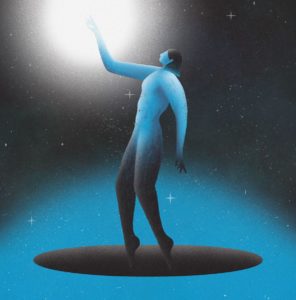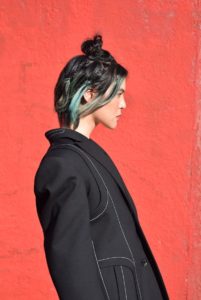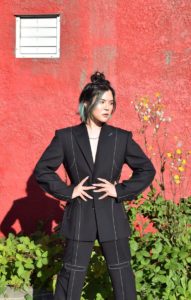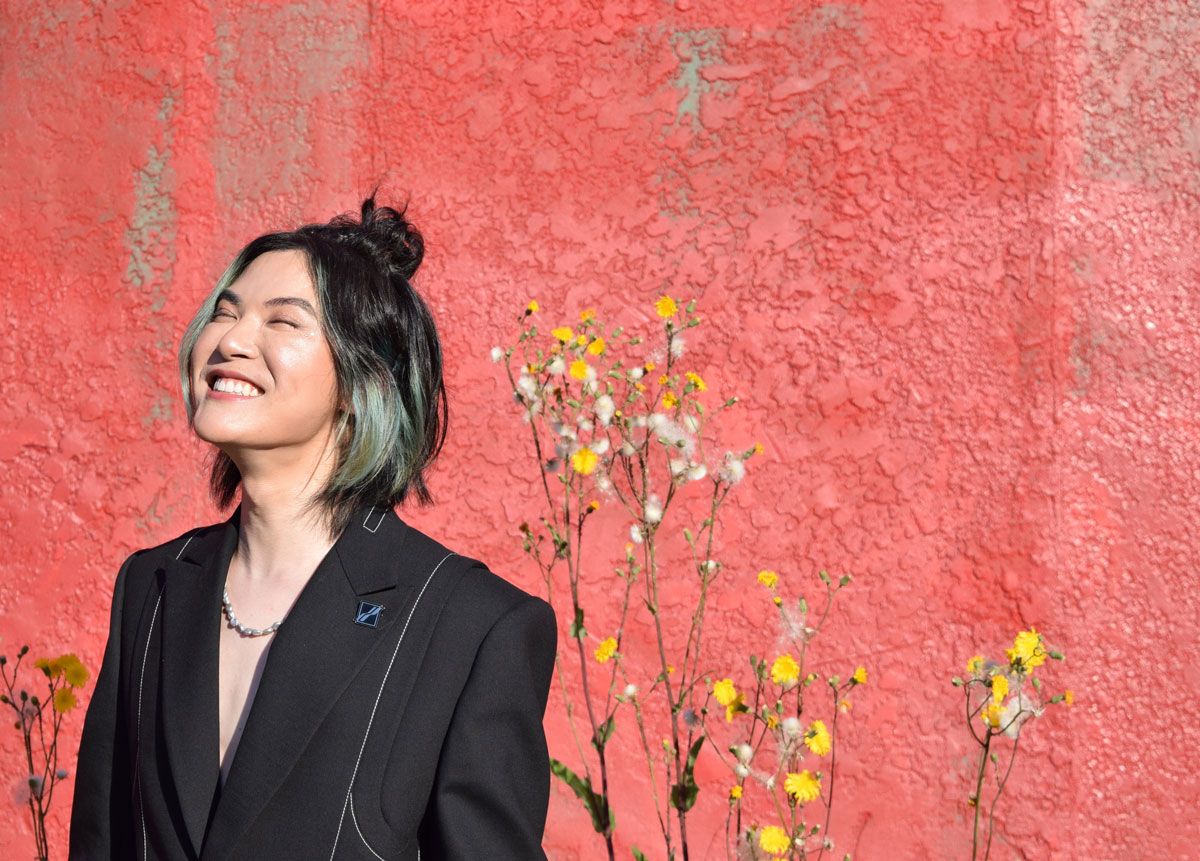Femininity can be aggressive and intimidating. Glitch-pop artist Carson Cheng’s — or KICCC’s — latest song “MRKMI” owns this sentiment and empowers femininity, turning it into a weapon. The track kicks off with snarky lyrics, rejecting toxic masculinity, or ego for that matter, which can be sugar-coated by high-brand fashion. The track’s heavy, low beat is reminiscent of a nightclub full of neon lights but also expresses something deeper. Some kind of new-found power.
KICCC is a non-binary Canadian-Chinese singer, who grew up in Vancouver and Macau, graduated from the University of British Columbia, where they studied interdisciplinary performance art. “MRKMI” is from their latest album Area 27, which uses very fluid, poppy and futuristic synthesizer sounds, and deviates from their previous, more masculine style of music. They agreed to sit with me — over a laptop screen — to discuss their latest release.

Erika: Thank you so much for setting aside time for us! Alrighty — let me first ask what your pronouns are to get this interview started.
Carson: It’s a bit of an interesting thing that I’m still navigating. My most correct pronoun, I guess, is Carson. Because that’s my given name. I never really went out of my way to change how people addressed me. I’m comfortable with he/she/they as long as it comes from a respectful place […] this is just personally, and maybe it’s because of my background as a performance artist. Performance and acting are all actually very neutral. It’s that we gender it, either by giving it a meaning, or assigning it feminine or masculine. So, when I go about my day, it’s not like I feel like I’m in a fixed state. Maybe for different purposes, I’m a different type of weight. That’s how I see myself, because, in the last little while, I’ve been experimenting more with my image or how I present myself. And of course that has to do with my thoughts about gender — it’s more about my neutrality towards gender because I think it is almost so irrelevant [to me]. Of course, I recognize this as a privilege, that I’m able to be in a safe environment where I can be so transient in my states.
E: Speaking of the change in your style, I have noticed that with Area 27, the melodies tend to be more poppy, cheerful and futuristic, right? And the visuals featured playful makeup, beautiful nails and costumes, and I think it’s a lot more feminine compared to your previous albums. I was curious what the intention behind all these changes was.
C: With my new work, I was trying to honor the part of myself that, in the past, I would have felt ashamed of, just because of social constructs and constraints in the industry I was working in. After university, I started working as an actor in Hong Kong and during that time, as a queer person, I essentially had to go back into the closet, or really just filter a lot of the things and just be this blank canvas. I was just starting out in the industry, and people had so many ideas of who I should be. They wanted a very cookie-cutter type of thing, but I’m a human with experiences. I’m a human with thoughts. I found it very hard for me to put that all away. So, I think working on “Area 27” was a bit of a death of all of those constraints […] I suddenly found a new power. Just like, “oh, I didn’t know I could perform this way, I didn’t know I could look this way.” You know? It’s fun. It’s refreshing, and I feel powerful.

E: I listened to your previous album “The Water Knows” too, and, comparing the two albums, I noticed a change in lyrics as well, like previously, it was more like a conventional, love songs’ lyrics.
C: I think so. Yeah, I wasn’t as brave with talking about exact subjects because, with my first album I was still a little bit shy. Maybe I was afraid like, “Oh god is this too queer?” because, especially in English language media, it’s like there’s still this bias towards Asian male queers. So, I felt like at that point I didn’t feel safe.
E: Absolutely, I guess I’m wondering now what was the turning point for you when you came to Vancouver, starting off totally new? Because you were already known as an actor in East Asia, right? And I was wondering if that’s because Vancouver was a more comfortable place for you.
C: I think that’s exactly it. When I started out in the entertainment industry, I was still very naïve. Vancouver is just a much more a liberal place, in terms of identity, politics, gender, sexuality, and stuff like that […] when I finished high-school in Macau, I remember opening up the newspapers and seeing that the legislative Council of Macau voted on marriage equality. It was something that was proposed by one of the legislators and he was the only one that voted in favour. Everyone else either abstained or rejected. As a queer person seeing that at a young age, I suddenly felt like, oh gosh, this place where I’ve grown up actually doesn’t want me to live a happy fulfilling life. So, I think that was quite shocking to me at some point.
E: It’s like a sudden feeling of being a minority, right?
C: Yeah, exactly. After working in Hong Kong I needed a bit of a refresh and that’s why I decided to focus on music. Now I’m very involved in the process. I’m writing the lyrics, coming out with my melodies, and I work with a producer that I communicate well with. I had some experiences in 2020 that weren’t very good. It made me think — why is there this pattern in my life that certain people take advantage of me, but keep it a secret? Because it’s not like they’re open about it. After those experiences, I just started to think, if guys see me a certain way, how can I subvert this to actually own it? Make it loud so they cannot use it as a point of shame for me? Because it’s about finding my strength again.
E: That’s amazing. It’s actually something I’ve been thinking about, like, owning a femininity. I’ve seen that strength in Area 27. For example, in MRKMI, there is this phrase that goes like, “I’m no China doll.”
C: Yeah, it was really fun. That song was a collaboration between me and two other artists — Kid Filthy and Lodia Mija. When we were writing that, I remember we were in the studio just chatting, and we realized what we actually wanted to express was, “we don’t fucking need you.”
E: Right? Let all the anger out. Another thing I liked about Area 27 was the visuals. You were wearing this costume that had a traditional Chinese pattern on it, and I wanted to know if it was important to include your Asian identity in the album?
C: For sure. Yeah, that was really important for me. Especially coming back to Vancouver to practice my art here. The costume you saw on the album cover is by local designer, Adam-Lin Bungag. That was really cool process because I was working with another person of Asian diaspora, and they are also queer. Translating that traditional shape into a sort of, androgynous femininity, was a very interesting experience for me and I felt very strong carrying my history in my own direction.

E: It’s a literal representation of Asian queer efforts.
Also, when I was [writing for] Area 27, I was also thinking about the deities I grew up with — for example, Guan Yin — I think there’s no gender to divine beings, and their tears carry a lot of magic and healing. I really wanted to channel that whole feeling into my costume.
E: I also wanted to talk about this assumption that expressing sexuality as a topic in the arts is like, a “western thing” and I’m curious what your opinion on that is, or, if that has influenced how you make music?
C: It’s a little bit complicated, because my music career is coming straight out of my acting career, in which there was always this element of infantilization. But then here in western media, there’s the opposite extreme — Asian males are often desexualized. So, in the beginning of my music career, even in my music videos, there was some removal of who I was as a person. But with “Area 27” I wanted to express that I had all these other things going on. I think about sexuality, and I think about other things too. I also had just broken up with someone that I was dating for like three years, and just, seeing a bunch of new people. It only takes one bad person to make you scared forever.
E: Oh my God. I’m so proud of how far you came! Thank you for sharing your story with me. Now you’re 28, and getting out of all these constraints, I want to hear about your fun upcoming projects!
C: I’m proud of myself too. And I’m very excited because I’m much more comfortable with myself, and there’s a lot more opportunity now with the possibility of being able to perform, or tour, or even go on holiday and forget about everything so I can get inspired again. Like this month, I was just taking it a bit slower, but next week I’m back into the studio already because I now have ideas that I want to work with. I have some songs that didn’t make it onto Area 27. It’s all still in development, but I think I’ll be releasing a music video for “Dead To Me” very soon.
Currently, KICCC is having fun live-streaming at @pewpewsloth.ttv. A full exploration of their world has just begun, so stay tuned to see more of Carson in future!


